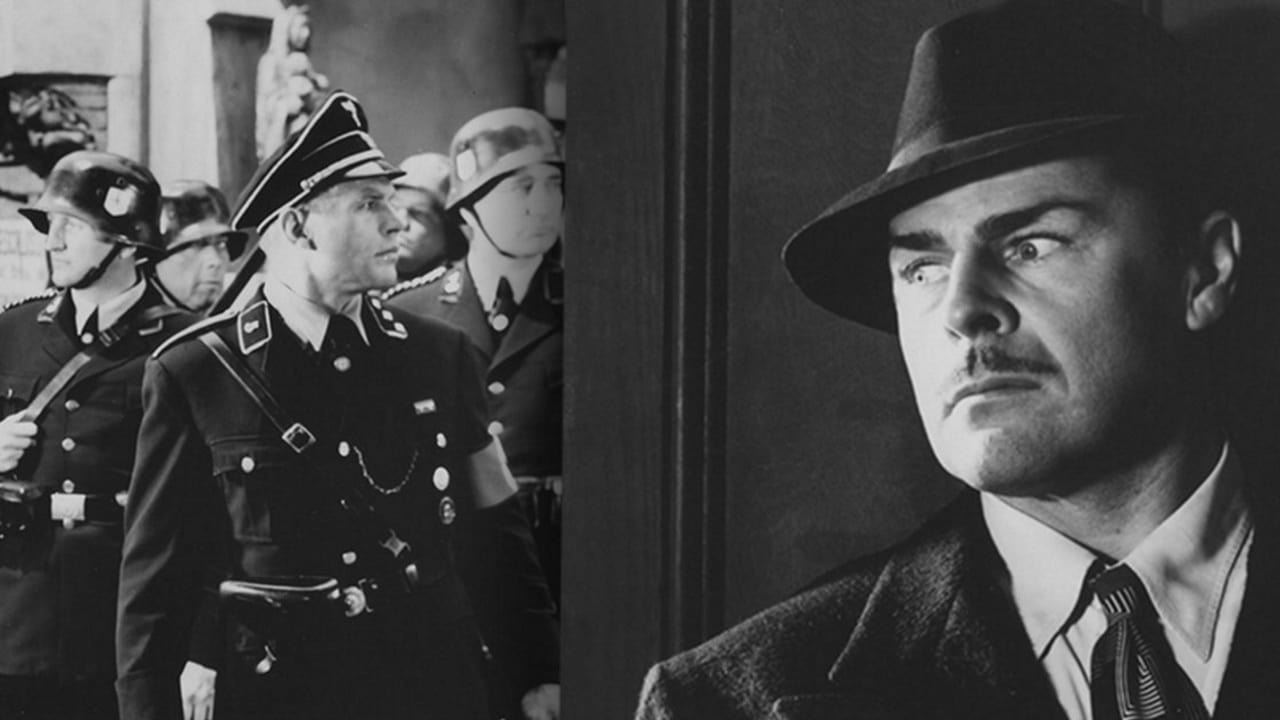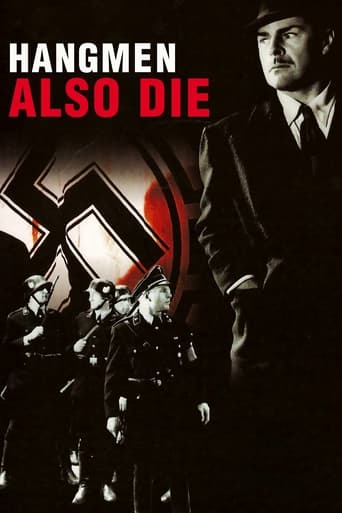AnhartLinkin
This story has more twists and turns than a second-rate soap opera.
Lollivan
It's the kind of movie you'll want to see a second time with someone who hasn't seen it yet, to remember what it was like to watch it for the first time.
Kirandeep Yoder
The joyful confection is coated in a sparkly gloss, bright enough to gleam from the darkest, most cynical corners.
Brooklynn
There's a more than satisfactory amount of boom-boom in the movie's trim running time.
Xjayhawker
Here and there you see faces that popped up throughout the forties. Brian Donlevy and Walter Brennan. I see most people consider this Fritz Lang film of 1943 to be quite good. I truly wish I could concur. The Germans don't act like Germans in the office behind a desk. The film is two things..world war II propaganda and massive over dramatization.. It is a lot of over acting..only ever able Walter Brennan does somewhat of a decent job, but I am quite sure he knew this would not be anything but rousing the spirit of all oppressed under the boot heel of Adolph Hitler..No acting nominations came of this and the dialog doesn't come off as authentic..I wish I could urge you to see this, but I cannot. There are many old forgettable films..alas, this is one.Sorry! Good actors..not good acting.
Claudio Carvalho
On 27 May 1942, in Prague, the Deputy Reich-Protector of Bohemia and Moravia "Hangman" Reinhard Heydrich is shot by the resistance member Dr. Franticek Svoboda (Brian Donlevy). After the attempt on Heydrich's life, Nasha Novotny (Anna Lee) gives the wrong runaway direction of Svoboda to the Gestapo agents. When Svoboda sees that he is trapped, he goes to Nasha's apartment seeking shelter and he introduces himself as the architect Karel Vanek. He is welcomed by the patriarch and former revolutionary Professor Stephen Novotny (Walter Brennan) and he spends the night with the family. On the next morning, the Gestapo captures hostages including Professor Novotny to force the population to denounce the assassin. Nasha goes to the St. Pancracio Hospital to seek out the resident surgeon Dr. Franticek Svoboda and ask him to surrender to the German authorities to protect the hostages. But sooner she learns that the occupation police has no intentions to let the prisoner go and she helps the resistance in the plan to frame the traitor Emil Czaka (Gene Lockhart). "Hangmen Also Die!" is a flawed but entertaining war propaganda film based on a true event, the murder of "Hangman" Reinhard Heydrich. The fictional plot of fight for freedom is engaging and it is interesting since it was filmed in 1943, before the end of the war. My vote is seven.Title (Brazil): "Os Carrascos Também Morrem" ("The Hangmen Also Die")
kenjha
This fictionalized account of the assassination of the Nazi leader of Czechoslovakia is long and dreary. Lang's most creative period started with "The Woman in the Window" in 1944 and included a number of fine films over the next decade. This once precedes that inspired period and is one of his lesser efforts, not helped by bad acting. Donlevy was an adequate actor for playing heavies, but here he is too stiff and charmless to be playing the lead. Lee, who would go on to become a regular in John Ford films, overacts terribly. Brennan does well, playing Lee's father. O'Keefe is also OK, and would have been a better choice for the Donlevy role.
RanchoTuVu
After Reinhard Heydrich is assassinated by the Czech resistance, the Gestapo goes all out to find his killer. Brian Donlevy gets top billing as the main star and Heydrich's killer, but the actors who portray the Gestapo officers, the Nazi matrons, and especially the one who portrays Heydrich, whom we see only in the opening scene of the movie, really give the film a sense of realism, not that Donlevy is wasted. The first scene with him in it is great, with James Wong Howe's camera right on his face as he's trying to find a room after the killing. This is as much a film about the Gestapo as it is about the resistance, thanks (perhaps) to Fritz Lang, who abandoned Germany after Hitler took power. In fact, Fritz Lang succeeds in bringing out the nuances of the resistance through Donlevy's part, the idea that one man (the killer) could (or should) surrender to the Gestapo in order to save hundreds of others from execution. And these are not faceless characters, but an actual family led by a professor played by Walter Brennan, with his daughter, the increasingly seductive Anna Lee, learning to see how this resistance works. The movie is spread a little thin at times, but develops a highly engrossing subplot involving Gene Lockhart as a wealthy Czech and Gestapo informer and his crumbling relationship with the Germans.

